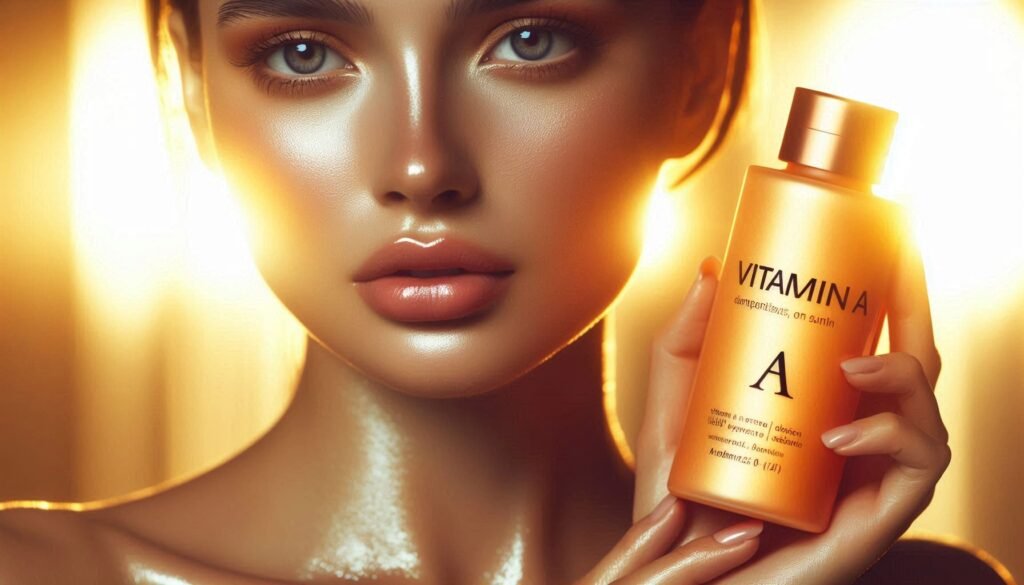Let’s be real: the world of skincare is a wild, confusing place. One day it’s all about snail slime, the next it’s mushroom serums, and don’t even get us started on the 10-step routines. But what if we told you that one old-school nutrient—Vitamin A—might just be the MVP your face has been waiting for? Yep, we’re talking about that classic vitamin your mom used to mention, now making a serious comeback in both lotions and supplements for skin health.
So, grab your favorite mug, settle in, and let’s break down why Vitamin A might be all you really need for your best skin ever.
The Science-y Side: What Is Vitamin A, Anyway?
Vitamin A isn’t just one thing—it’s a whole family of compounds, including retinol, retinal, retinoic acid, and the plant-based precursor beta-carotene. Your body loves Vitamin A because it helps with vision, immune function, and, yes, keeping your skin looking fabulous
When it comes to skin, Vitamin A works its magic in two main ways:
- Topically (as creams, lotions, or serums): Think retinol, retinaldehyde, and prescription retinoids like tretinoin.
- Orally (as supplements or from food): Your body converts what you eat into active forms that nourish your skin from the inside out
Why Your Skin Loves Vitamin A
1. Smooths Out Wrinkles and Fine Lines
Vitamin A-based creams and serums (aka retinoids) are hands-down the most studied and effective anti-aging ingredients out there. They boost collagen production, speed up cell turnover, and help fade those pesky age spots. In fact, studies show that regular use of topical tretinoin (a prescription retinoid) leads to significant improvement in fine and coarse wrinkles, roughness, and even sun-induced spots. Over-the-counter retinol isn’t as powerful as prescription stuff, but it still helps soften lines and improve skin texture—just with a little more patience.
2. Fights Acne and Keeps Pores Clear
If you’ve ever battled breakouts, you know how stubborn they can be. Enter Vitamin A: retinoids unclog pores, reduce oil, and help clear up acne like a boss. They also fade acne scars by stimulating collagen and gently exfoliating the skin’s surface. No wonder dermatologists have been prescribing them for decades.
3. Brightens and Evens Out Skin Tone
Hyperpigmentation, melasma, and dark spots don’t stand a chance. Vitamin A products encourage your skin to shed old, pigmented cells and replace them with fresh, glowing ones. That means a brighter, more even complexion—no fancy filters needed.
4. Boosts Elasticity and Firms Skin
Vitamin A helps your skin stay bouncy and youthful by stimulating the production of new collagen and elastin fibers. This means firmer, tighter skin and fewer saggy spots over time.
5. Protects Against Environmental Damage
Beta-carotene, the plant-based form of Vitamin A, is a powerful antioxidant. It helps shield your skin from UV rays and pollution, reducing sun damage and slowing down photoaging. It’s like a tiny superhero working behind the scenes.
6. Speeds Up Healing and Reduces Inflammation
Vitamin A is essential for wound healing and calming inflammation. If your skin is prone to irritation, redness, or slow-to-heal blemishes, making sure you’re getting enough Vitamin A can make a big difference.
Lotions, Creams, and Serums: The Topical Power of Vitamin A
Let’s talk products. Not all Vitamin A creams are created equal, so here’s a quick cheat sheet:
| Type of Vitamin A | Strength | Best For | Notes |
|---|---|---|---|
| Retinyl Esters | Mild | Sensitive skin, beginners | Least irritating, slow results |
| Retinol | Moderate | Anti-aging, acne, glow | OTC, gentle but effective over time |
| Retinaldehyde | Strong | Faster results, anti-aging | More potent, still OTC, some irritation possible |
| Retinoic Acid (Tretinoin) | Very Strong | Deep wrinkles, stubborn acne | Prescription only, best results, most irritation |
Prescription retinoids like tretinoin are the gold standard for anti-aging and acne, but even over-the-counter retinol can give you smoother, brighter skin if you stick with it.
Pro Tips:
- Start slow—think a couple nights a week—and work your way up to nightly use.
- Always use sunscreen in the morning! Vitamin A makes your skin more sun-sensitive.
- Expect some dryness or peeling at first; that’s your skin adjusting to its new routine.
Supplements: Nourish Your Skin from Within
Topical products are great, but what about Vitamin A supplements? Here’s where things get interesting.
Oral Vitamin A can:
- Support healthy skin cell turnover and repair from the inside out
- Help maintain a strong skin barrier, keeping moisture in and irritants out
- Improve overall skin appearance, especially if you’re deficient
A recent study found that taking Vitamin A supplements provided an extra boost to skin appearance, especially in people who weren’t getting enough from their diet2. Plus, Vitamin A deficiency is linked to dry, rough, and breakout-prone skin—so keeping your levels up is a smart move5.
But a word of caution: Too much Vitamin A (especially from supplements) can be harmful. Stick to recommended doses unless your doctor says otherwise, and remember that more isn’t always better.
Why Vitamin A Might Be All You Need (Well, Almost)
Let’s recap. Vitamin A—whether in a lotion, cream, or supplement—can:
- Reduce wrinkles and fine lines
- Clear up acne and fade scars
- Even out skin tone and brighten your complexion
- Firm and tighten sagging skin
- Protect from sun and pollution damage
- Speed up healing and soothe irritation
- Support healthy skin from the inside out
With a track record like that, it’s easy to see why some people ditch the complicated routines and just stick with their trusty Vitamin A. It’s like the Swiss Army knife of skincare—simple, effective, and backed by decades of science.
Are There Any Downsides?
Vitamin A is powerful, but it’s not a magic potion. Here’s what to watch out for:
- Irritation: Especially when starting retinoids, you might get redness, dryness, or peeling. Go slow and moisturize well.
- Sun Sensitivity: Always pair your Vitamin A routine with SPF in the morning.
- Overdoing It: Too much Vitamin A (especially from supplements) can cause side effects like headaches, nausea, or even liver issues. Stick to safe doses and talk to your doctor if you’re unsure.
- Not for Everyone: If you have certain skin conditions (like eczema or rosacea), or if you’re pregnant, check with your healthcare provider before starting Vitamin A products.
The Bottom Line: Keep It Simple, Keep It Glowing
In a world overflowing with fancy serums, sheet masks, and beauty gadgets, Vitamin A stands out as a tried-and-true hero for facial skin health. Whether you’re smoothing on a retinol night cream or popping a supplement (responsibly!), you’re giving your skin exactly what it needs to look and feel its best.
So next time you’re tempted by the latest skincare fad, remember: sometimes, all you need is a little Vitamin A love. Your skin—and your wallet—will thank you.
(Remember, always check with your dermatologist before making big changes to your skincare routine!)
Sources:
- Linus Pauling Institute https://lpi.oregonstate.edu/mic/health-disease/skin-health/vitamin-A
- MDPI Study on Oral Vitamin A https://www.mdpi.com/2079-9284/10/5/144
- PubMed Central Review https://pmc.ncbi.nlm.nih.gov/articles/PMC9324272/
- Harvard Health https://www.health.harvard.edu/staying-healthy/do-retinoids-really-reduce-wrinkles
- Vibrant Skin Bar https://vibrantskinbar.com/blog/vitamin-a-skin-care/
- PMC Evidence Review https://pmc.ncbi.nlm.nih.gov/articles/PMC8675340/
- Cleveland Clinic https://my.clevelandclinic.org/health/treatments/23293-retinol
- Mount Sinai https://www.mountsinai.org/health-library/supplement/vitamin-a-retinol








